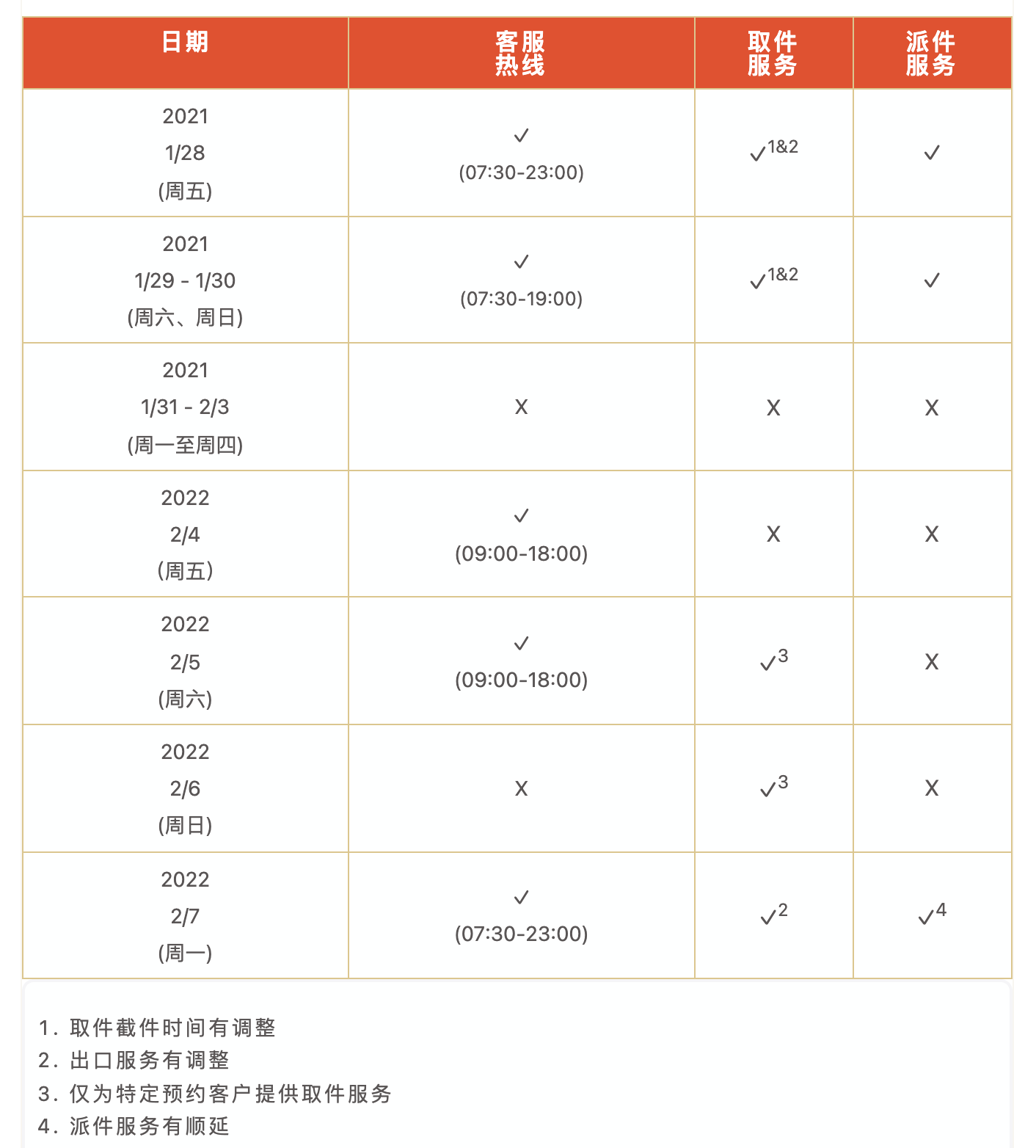Domestic express delivery "does not close during the Spring Festival", so it is necessary to pay attention to the suspension time of express service for large items.
Domestic express delivery "does not close" during the Spring Festival, but it is still necessary to pay attention to the suspension of service hours of some express companies.
As of January 26th, more than 10 major domestic express delivery companies, such as Cainiao, Shunfeng, JD.COM, Zhongtong, Yuantong, Shentong, Yunda, Jitu, China Post and Flash Delivery, have issued notices that they will not close for the Spring Festival.
Among them, Zhongtong, Shentong, Yunda and Jitu’s "Spring Festival service" is from January 30, 2022 (the 28th day of the twelfth lunar month) to February 4 (the fourth day of the first month). The operation mode of Yuantong Spring Festival is from January 30, 2022 (the 28th day of the twelfth lunar month) to February 3, 2022 (the third day of the first lunar month).
According to the announcements of Zhongtong, Yunda and Polar Rabbit, during the Spring Festival, except for the epidemic situation and remote areas, the whole country provided normal dispatch services, and normal express delivery services were provided on other days.
Some express delivery costs have temporarily increased.
The prices of some courier companies have been adjusted during the Spring Festival. According to the announcement of SF Express, during the Spring Festival, express mail and resources are scientifically and reasonably scheduled and matched, and some service charging standards are dynamically adjusted. From January 10th to January 30th, SF will charge 0.2 yuan /kg -1 yuan/kg resource adjustment fee for products such as standard express and products larger than or including 20kg SF Express. During the Spring Festival holiday from January 31 to February 6, SF will charge a resource adjustment fee for the mutual delivery service in major cities; For some customers who have long-term and in-depth cooperation with each other on a monthly basis, the resource adjustment fee will be reduced or exempted, and diamond and above SF members will be exempted from the resource adjustment fee.
According to the announcement of Zhongtong, the guiding price during the Spring Festival is: the weight of express mail is less than 1kg (that is, the billing weight ≤ 1kg), the increase does not exceed 1.5 yuan/single; If the express weight is more than 1kg (that is, the billing weight is more than 1kg), the increase of the first quotation shall not exceed 1.5 yuan/single, and the increase of the continued quotation shall not exceed 0.3 yuan /kg.
The relevant personnel of Polar Rabbit told the The Paper that during the Spring Festival, due to the increase in labor and transportation costs, the price of express delivery will be adjusted in a small range according to the actual needs of the receiving outlets; On the whole, on the basis of the original cooperative price, the price increase of the first weight (1KG) does not exceed that of 1.5 yuan, and the increase of the second weight does not exceed that of 0.3 yuan/kg; For the specific delivery price, please contact the relevant receiving and dispatching personnel and the collection outlets for consultation.
Some companies have launched an upgrade measure of "No Closing during the Spring Festival". It is reported that during the Spring Festival, Cainiao invested 150,000 employees, which were distributed in the nationwide warehousing and distribution network, manufacturing origin warehouses, rookie stations, global cross-border bonded warehouses, overseas warehouses, etc., to ensure Taobao Tmall consumers in 300 cities across the country to receive goods as usual. Danniao Logistics, a subsidiary of Cainiao, will keep delivery in 100 cities across the country during the Spring Festival, and Cainiao Station will continue to guarantee the delivery of Tmall Taobao parcels to your door.
In terms of express delivery in the same city, Flash Express said that during the Spring Festival, it will continue to provide one-to-one instant delivery services to 229 cities in China, including Beijing, Shanghai, Guangzhou, Shenzhen, Hangzhou, Chengdu, Wuhan, Nanning, Taiyuan and Nanjing. The customer service of SF Express said that the express delivery service provides 365-day round-the-clock service throughout the year.
In terms of international express delivery, DHL and FedEx of Sinotrans announced that their services would be suspended from January 31st to February 6th. UPS UPS will suspend delivery service from January 31st to February 6th. The specific arrangements are as follows:

UPS service arrangement during the spring festival
Pay attention to the suspension time of express service for large items.
In terms of express delivery, according to the incomplete statistics of The Paper reporter, except for Debon Express’s big-ticket delivery, many major express delivery companies in the industry have not closed during the Spring Festival, so it is necessary to pay attention to the suspension time of various services.
Express business mainly focuses on large-scale freight transportation, and provides door-to-door transportation services for objects larger than express parcels in weight, quantity and volume. At present, the main participants in the domestic LTL market include SF Express, Debon Express, Anneng Logistics, Baishi Express and Zhongtong Express.
Debon Express said that during the Spring Festival, the express service network will cover the whole country, with more than 5,000+direct outlets operating normally. Except for the epidemic situation and remote areas, it can provide normal collection and delivery services, and will continue to provide delivery services such as "booking before delivery, delivery upstairs", and insist on going upstairs for free up to 60kg.
The Paper reporter called the customer service of SF Express on January 26th, and the other party said that some routes of SF Express will be suspended from January 31st to February 3rd, and there is no other specific notice yet.
Zhongtong Express said that during the Spring Festival, it will have a holiday from January 26, 2022 (the 24th day of the twelfth lunar month) to February 7, 2022 (the seventh day of the first month) and resume normal operation on February 8, 2022 (the eighth day of the first month). At the same time, Zhongtong Express said that the company’s car line will be gradually stopped before the holiday, and the specific collection and delivery time in the country can be consulted with local outlets. The timeliness of receiving and sending goods before and after the Spring Festival may be affected.
According to Yunda Express, the Spring Festival holiday time is from January 26, 2022 (the 24th day of the twelfth lunar month) to February 6, 2022 (the sixth day of the first lunar month), and officially resumed on February 7 (the seventh day of the first lunar month). On the eve of the holiday, the company’s car line will be gradually stopped. Please consult the local outlets for the specific collection and delivery time in the country.
In addition, both Best Express and Anneng Logistics were on holiday from January 25th, 2022 (the 23rd day of the twelfth lunar month) to February 8th, 2022 (the eighth day of the first month), and the whole network resumed normal operation on February 9th (the ninth day of the first month). Anneng Logistics announced that the company’s car line will be gradually stopped before the holiday, and local outlets can be consulted for specific delivery time throughout the country. The timeliness of receiving and sending goods before and after the Spring Festival may be affected. Please make arrangements in advance.
Pay attention to the safety of express delivery and disinfection inside and outside.
Under the repeated epidemic situation, the safety of domestic and international express parcels once became the focus of public attention. Relevant personnel of several express delivery companies have previously told the The Paper reporter that there is no operation to prompt whether there are risks in packages delivered in China, and users need to know the route of each package’s transportation process by themselves. In addition, it is necessary to pay attention to public opinion information related to national epidemic prevention and control in real time.
According to CCTV news reports, on January 19th this year, Zhang Liubo, chief expert of disinfection science of China CDC, said that Covid-19 would not only pollute the packaging of mail, but also the goods inside, so we should attach great importance to the spread risk of the goods inside the packaging.
Major express delivery companies have carried out multi-layer disinfection of parcels in various links of express delivery, but the disinfection and protection of express goods still need to be carried out by users themselves. According to the tips of "safe delivery" given by Yuantong Express, users wear masks to take delivery, reduce contact and communication with couriers, and try to keep it above 1 meter if they need to sign for it; Take 75% alcohol or prepared 84 disinfectant and spray it on the courier box. If not, try not to touch it directly with your hands, but wear disposable gloves or put paper towels on it. Try not to bring the courier box into your home, and then throw it at the designated place when you go out to throw the courier;After the goods are brought into the home, spray alcohol on the purchased goods or leave them in a dry and ventilated place for 30 minutes..

